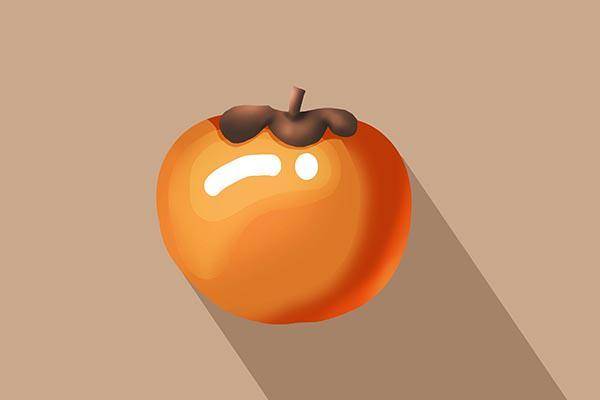In general, autumn is the time when persimmons hit the market, but in winter, persimmons still have a place among daily snacks and fruits.
For example, people in some cold regions will place persimmons on the windowsill and make frozen persimmons to eat. Some people will directly turn persimmons into persimmon cakes or persimmon frost for storage and consumption during the Chinese New Year… People have a great love for persimmons, there is even a saying “one persimmon is worth ten medicines” in folk culture.
Persimmons have high nutritional value, with effects such as clearing heat, relieving cough, moistening dryness, resolving phlegm, preventing constipation, lowering blood pressure, and stopping bleeding.
However, no matter how high the nutritional value of persimmons is, ultimately it is still a type of fruit. The targeted disease treatment function of Chinese medicine cannot be compared to persimmons. The saying “one persimmon is worth ten medicines” is mostly an exaggerated statement.
Despite persimmons’ functions not meeting the exaggerated claim of “ten medicines,” their value for consumption and medicinal purposes cannot be denied. The phrase “persimmons are all treasures” is not at all false.
First, there is “persimmon flesh”
In traditional Chinese medicine, persimmon flesh is described as sweet, astringent, and cool in nature, with good effects in clearing heat, moistening the lungs, generating fluid, quenching thirst, invigorating the spleen, and benefiting the stomach. Persimmons have a high water content and a considerable amount of sugar. Eating persimmons appropriately can have a very good relieving effect on dry throat symptoms in winter.
Next is “persimmon leaves”:
The value of persimmon leaves should not be overlooked. Generally, people who understand health preservation will use persimmon leaves to make tea.
Similar to tea leaves, persimmon leaves contain tannins that can clean blood vessel fat, reduce the risk of cardiovascular diseases. Regular consumption can soften blood vessels, reduce inflammation risks, promote cell regeneration, especially suitable for elderly people who love health preservation.
In addition, there are differences between persimmon leaves and tea leaves. For example, substances like caffeine and theophylline found in tea leaves are absent in persimmon leaves. Hence, drinking persimmon leaf tea regularly will not affect sleep. On the contrary, it has a calming effect and can improve sleep quality.
Lastly, there is “persimmon calyx”:
The persimmon calyx is actually a kind of Chinese medicine. According to the “Compendium of Materia Medica,” persimmon calyx has a significant effect on treating symptoms such as hiccups, nausea, cold cough, and frequent urination in children.
A common method in TCM is to grind persimmon calyx, clove, ginseng, and other Chinese medicinal herbs into powder, mix with warm water for consumption. This not only alleviates hiccups, coughing, and other symptoms but also promotes blood circulation and maintains sufficient blood supply to the body. Especially for elderly people in winter, it is highly recommended to try. However, even though persimmons are beneficial, it is important not to assume that all parts of the persimmon are edible. Most of us have heard our elders say that while persimmons are nutritious, it is best not to eat the skin. Why is that?
We all know that persimmons contain a certain amount of tannic acid, which is concentrated in the persimmon skin. When tannic acid enters the stomach, it easily combines with various minerals such as calcium, zinc, magnesium, and iron, forming insoluble precipitates. This increases the burden on the stomach, leading to indigestion, bloating, abdominal pain, and other symptoms.
Therefore, as good as persimmons are, it is best to discard the persimmon skin and refrain from eating it, so please pay attention to this, all health enthusiasts.
Additionally, during the process of eating persimmons, attention to certain details is necessary for a healthier and more nutritious experience.
Detail One: Do not eat on an empty stomach
Although most of the tannic acid in persimmons is concentrated in the skin, there is still tannic acid in the pulp. Eating on an empty stomach exposes tannic acid to nutrients in the digestive system more effectively, leading to more precipitates and more obvious symptoms of digestive obstruction such as abdominal pain and vomiting.
As persimmons are inherently cold in nature, eating them on an empty stomach can directly stimulate the intestines and stomach, so please be cautious.
Detail Two: Limit intake for those with high blood sugar
Although persimmons have high nutritional value, with a sugar content as high as 10.8%, the sugar content, mostly monosaccharides, may still be too high for individuals with high blood sugar or diabetes. The sugars in persimmons are easily absorbed by the intestines. Therefore, it is best for diabetic patients to avoid persimmons, and those with high blood sugar should consume them in moderation.
Detail Three: Avoid mixing with high-protein foods
Although the claim that “eating persimmons with seafood can cause poisoning” has long been debunked, it is still not recommended to mix persimmons with high-protein foods.
This is not due to the risk of poisoning but rather because the combination of tannic acid in persimmons with proteins forms the most precipitates, having the greatest impact on the digestive capacity of the stomach. Excessive mixing can lead to the formation of gastric persimmon stones, which is truly detrimental.
Therefore, it is best to avoid combining persimmons with high-protein foods such as seafood, meat, eggs, and dairy products.
Overall, while persimmons are indeed treasures with undeniable nutritional value, attention to the details of consumption and methods is still necessary. Consuming persimmons in a healthy and reasonable manner during winter can bring the maximum health benefits.
References:
[1] Hai, Y. The Harm of Eating Persimmons on an Empty Stomach. Agricultural Processing, 2012(10):55.
[2] Wang, X. Be Cautious When Eating Persimmons. Health Guide, 2020(01).
[3] The Edible Efficacy of Persimmons. Modern Food, 2016(17):112.


